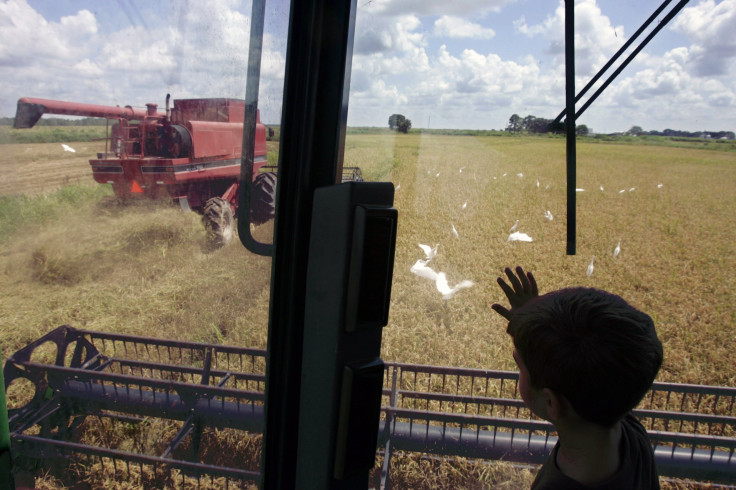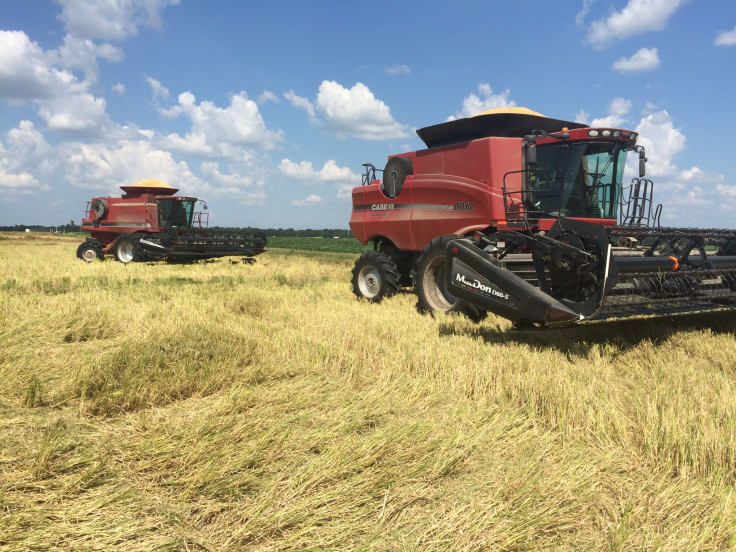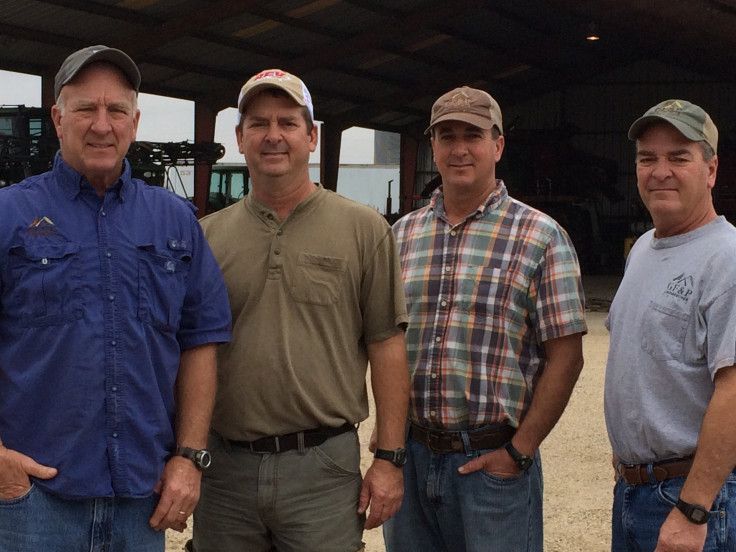US Trade Policy: In Trump's America, Louisiana Rice Farmers Hope For New Market

Set against a calm blue sky and acres of flat, open land, a whirling hydraulic drive wheel grumbled through the silence as it churned into the ground, pushing a boat along the shallow waters of Fred Zaunbrecher’s rice farm in Rayne, Louisiana. It was the middle of January and they were harvesting crawfish, fishing in sacks of the critters that thrive in the stubble of the rice fields picked clean from the summer’s harvest.
The crustaceans, a Louisiana delicacy, help feed steady revenue to Zaunbrecher and his three brothers who oversee the farm. The crawfish are a stable business, but the rice – the principal crop for Zaunbrecher – is not. A barrel goes for just $16 these days, down from about $25 four years ago, he said.
"Our livelihood right now is growing rice and selling it. And we plan on being in this business for a long time," Zaunbrecher, 59, told International Business Times. "We're optimistic that things are going to improve. If they don't, we're going to be out of business."
Recently, there has been fresh cause for hope: Cuba. It's a nearby, rice-loving country with whom trade had long been forbidden because of an embargo. But under President Barack Obama, the United States has worked to ease those restrictions. No state was more excited by that prospect than Louisiana, which has precedent for doing business with the country and recently dispatched trade delegations there amid the president's new policies.
Relations with Cuba, however, have been thrown into a limbo-state with the election of President-elect Donald Trump, who has threatened to walk back normalization efforts. In the deeply red state of Louisiana, the prospect of a Trump presidency largely breeds excitement – and Zaunbrecher is no exception – but the president-elect's hostility toward Cuba could create another roadblock for the Louisiana rice industry hoping to rush into a brand new, potentially lucrative market.
"I think if you could snap your fingers and get the Cuba market going, rice would probably go up three or four dollars a barrel right away here," Zaunbrecher said. "It would just be that good."
Under Trump, that might never happen.

About one month before Election Day, a Louisiana trade delegation that included Gov. John Bel Edwards went to Cuba. During that trip leaders from the Louisiana Department of Agriculture and Forestry (LDAF) signed, as did Cuban officials, a memorandum of understanding to conduct trade once rules were lifted.
"We have some of the best agricultural products and logistically, it makes more sense for the Cubans to trade with us," LDAF Commissioner Mike Strain said at the time. "We want to ensure we are on the same playing field as everyone else once trade restrictions are relaxed."
The idea was to be first in line should the embargo be lifted. In conversations with people involved in Louisiana trade, nearly all said it was natural for rice to be the first product to export. It could also prove to be a valuable endeavor. Cuba imports about 80 percent of its food and has the highest per-capita rice consumption in the Western Hemisphere. It currently gets most of its rice from Vietnam but used to pay high prices for U.S. rice varieties.
And while other U.S. states do grow rice, there's a history of trade between Cuba and Louisiana, which has exported more than $1.4 billion in allowed essential goods to the island nation over the past decade. Virginia has exported the second-most over that time at just $424 million. With Obama making tangible normalization progress and Louisiana officials making inroads with visits to the country, trade with Cuba was beginning to seem like a very real boost on the immediate horizon for rice growers.
Elton Kennedy, a rice producer in Louisiana, has been to Cuba twice as a part of trade delegations. "We're all hungry to do business with them," he said to IBT. "They're certainly anxious to do business with us."
But because of the oppressive socialist Castro regime in Cuba – and an important bloc of Republican Cubans in the swing state of Florida who escaped the country – normalizing relations with the country can prove politically tricky. Louisiana rice producers have realized this and Trump has already adopted some hard-line stances, such as when he threatened to reverse what Obama has already done, like allowing U.S. flights into Cuba.
After the death of Cuban dictator Fidel Castro, Trump tweeted: "If Cuba is unwilling to make a better deal for the Cuban people, the Cuban/American people and the U.S. as a whole, I will terminate deal."
Trump has also appointed Mauricio Claver-Carone, a staunch pro-embargo lobbyist, to his transition team, which doesn't bode well for anyone hoping for further loosening of restrictions.
Zaunbrecher's farm sits about 15 miles outside of Lafayette in southwestern Louisiana. He took over running the place some 30 years ago after his father died. It has remained a family affair. He and his brothers Phillip, Paul and Bill — Fred's the oldest at 59, Bill the youngest at 45 — grow rice in rotation with soy beans, while also producing crawfish. Zaunbrecher, who has a master's degree in agronomy from Louisiana State University, won the USA Rice Federation's Farmer of the Year in 2014, a testament to his hard work.
It's dark when he wakes in the morning, piling into his white Ford F-350, driving 15 minutes to the farm from his home in nearby Duson. When the sun goes down, the work keeps going. It's in his blood – his family ended up in southwestern Louisiana after his great-great grandfather, a Catholic, fled religious persecution in Germany in the 1880s. He, too, grew rice.
The Zaunbrechers have continued to grow the same crop: tossing seeds into wet ground every March, eventually flooding the fields, then draining them and harvesting each summer. But the hard work remains at the mercy of outside forces.
"You know there's a lot of pride involved with being a farmer," Zaunbrecher said. "It's a lot of stress too: you're dealing with Mother Nature and markets. We don't have much control over either one."
He described falling rice prices amid U.S. complaints with the World Trade Organization concerning price depression from other rice-growing countries. That's a major problem considering rice producers are required to export half of their crop.
At the current prices, it has been hard to make a profit. A torrential storm this year that damaged rice crops and nearly destroyed soy crops has made things even worse. Experienced with the ups-and-downs of farming, Zaunbrecher said he knows to save for years like this. However, some folks were going to struggle to pay back debts — and he has concerns about the future of his farm.
Re-opened trade with Cuba could turn it all around. Getting rice to Havana hardly costs anything at all, which keeps costs low. The demand is there and Louisiana has all the necessary infrastructure in place.
"Every rice producer in Louisiana is looking forward to the day we can trade with Cuba," Zaunbrecher said. "It would be unbelievable."
Zaunbrecher is a lifelong conservative and a staunch Trump supporter, not uncommon in a state where the president-elect won 58 percent of the vote. Active in USA Rice, Zaunbrecher goes to Washington, D.C., once per year to speak with lawmakers and said he felt the "country was going to hell in a hand-basket and now we may get out of that rut." He was hoping Trump will negotiate trade deals for better prices and bring down insurance costs. But that doesn't mean Zaunbrecher is without concerns.
"Republicans normally will shut things down with Cuba as they have in the past," he said. "We're kind of apprehensive about what Trump's going to do."

In the weeks leading up to Trump's inauguration, Zaunbrecher was enjoying the slow part of the year, relatively speaking. He went deer hunting in Texas with his wife, Candee, to whom he's been married for 37 years. He's got two adult children and a couple of grandkids — they get together to watch football, celebrate birthdays, have a crawfish boil.
The number of U.S. farmers has been falling and the ones who remain are older and making less money. Even in the Zaunbrecher family, apart from one nephew, the younger generation has largely navigated into different jobs in part because the work is grueling and unpredictable.
"The only way these farms can continue is if someone has the grit to take it on," he said. "There's a lot of pride involved. It's gratifying to see what you planted to come to fruition."
© Copyright IBTimes 2025. All rights reserved.





















